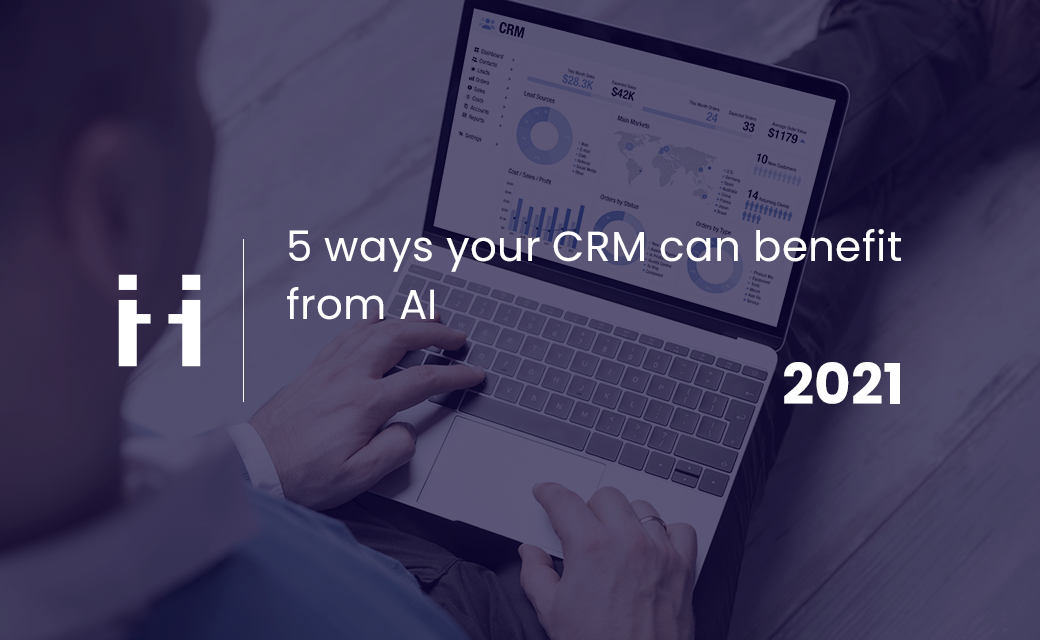
Share this article
Share this article
In recent years, artificial intelligence (AI) technology has revolutionized the world of business and sales. In fact, its worldwide revenues are predicted to reach up to $97.9 billion by 2023. It comes as no surprise then that AI has become one of the newest technologies to be implemented within customer relationship management (CRM). How can such revolutionary integration help grow your business?
CRM is a vast system of different products and tools that enable the effective management of customer interactions across a company. Your CRM strategy depends on what focus points you want to tackle and the features you want to use. It is hence crucial to distinguish the main three types of customer relationship management and the different benefits they can bring to you and your organization.
Collaborative CRM focuses on connecting different departments within the business – be that the sales team,customer service agents, the IT desk, etc. The key features offered by the collaborative system are interaction management, channel management, and document management.
The main task the collaborative CRM software tackles is ensuring that all employees have access to the same customer data, so all departments are always on the same page. Previous customer experience, reports of customer satisfaction, customer interaction feedback – collaborative CRM makes these important details easy to reach at any time. With such smooth customer data processing, the staff can perform their duties quickly and confidently, and the customer doesn’t need to waste their time on repeating the issue details.
Collaborative CRM therefore focuses on increasing customer satisfaction and reaching for higher customer retention. Whether you run a small company or a big organization with departments spread around the globe, collaborative CRM offers tools that will help you share all the essential information across the whole business in real time for the most seamless customer experience.
Operational CRM provides features and tools to efficiently visualize and handle each customer from beginning to end. It focuses on tracking, managing, and improving customer experience as a whole – from the customer’s first interaction with the company, whether through the website, social media platforms, or a personal recommendation, to the moment they decide to put their trust in the business and become loyal customers.
The main feature the operational software provides is process automation, mainly within sales and marketing, but also in service operations. This can be done through automating marketing email campaigns created based on regular customer activities, automating the lead scoring process and sales reps task delegation, or automating satisfaction surveys.
As the automated processes are based on regularly updated customer data, they create a more personalized customer experience that strengthens the business-customer relationship. What’s more, automation allows the business to offload work from employees and give them more time to pursue a proactive and personal approach to their work, while maintaining the quality of business performance.
As the name suggests, analytical CRM focuses on analyzing customer data to extract insights on the company’s overall performance and position on the market. With the use of digital tools and platforms, analytical CRM allows you to monitor your business performance, your customers’ behavior, and any incoming industry trends.
Analytical CRM is the perfect system for getting to know your company better in all its aspects, understanding its strengths and weaknesses, and evaluating which steps to take to lead to the highest sales and boosted customer retention. It is hence a very efficient way to develop a successful high-level strategy that is unique to your business.
CRM systems keep track of vast amounts of customer data. As the main aim for collecting this much data is to learn about your customers from your customers themselves, it is important to keep in mind which information will help you achieve it the most effectively.
Firstly, one of the key data entries CRM collects are lead sources, which are the ways in which new customers can be drawn to your business. Your company’s website, a particular social media post, an email campaign, word of mouth… Clients now find more and more diverse ways to discover businesses, hence keeping a record of where your customers come from is a must for evaluating the most acute growth strategy.
To promote customer retention, CRM also collects data related to customer satisfaction, customer sentiment analysis, outreach effectiveness, campaign performance, and customer loyalty – all of which can be described as customer lifetime value (CLV) data. By monitoring customer satisfaction across service areas, CRM facilitates making changes to ensure a long customer lifecycle.
One of the most essential data entries CRM focuses on is your company’s win rate. Keeping track of the deals you closed can be a great indicator of the performance of your sales department. After what time do customers disactivate their accounts? Why do they choose to withdraw from your services? Which point of contact brought the most fulfilment to the customer? This is necessary information to understand which tactics to implement in the future to boost your win rates.

Here are key five benefits an AI-powered CRM can bring to your business:
AI can serve as a helping hand to sales reps with the most basic, mundane tasks that surprisingly take up a lot of time. Managing accounts, organizing schedules, managing data entry, logging lead engagement, providing customer support via an automatic online chat, generating customized emails, tracking business expenses – with the help of AI, you can do it all automatically, allowing your sales team to boost sales and increase productivity by up to 50%.
The AI algorithm provides a unique, personal insight into each customer. By tracking and automatically segmenting vast amounts of data, and by focusing on predictive analytics, sales reps can understand their customers’ habits, preferences, dislikes, purchase history, as well as other online interactions. With such detailed expertise about each customer, companies can better understand how to approach the communication process and make the customer feel valued, so they continue putting their trust in the company.
With the customer knowledge that AI-driven CRM provides, it is much easier to indicate which areas of your business improve customer engagement in real time so you can invest more energy into optimizing them. Simultaneously, you can track where your customers’ satisfaction is low and make improvement decisions accordingly.
As AI-enabled CRM gives an opportunity to save valuable time through process automation, sales reps can put more energy into interacting with customers and developing relationships with them. The customer sees that the company values customer retention over customer acquisition and feels comfortable enough to develop a stronger bond with the staff.
The AI algorithm has the ability to predict future customer decisions by analyzing their responses and emotions. It is hence beneficial to use AI technology within your knowledge management base and leverage its analyzing abilities to learn from your past patterns, successes, and mistakes. This knowledge gathering allowed by AI has impacted the ways companies organize their logistic processes by improving the prediction of the needs and thus, optimizing the usage of the companies resources.
Implementing innovative solutions like AI technology in your CRM processes can give you a valuable advantage and make you stand out from the industry crowd. Ultimately, CRM is what defines the levels of your customers satisfaction and allows for long-lasting customer loyalty and successful, sustainable customer retention. In the end, a customer who trusts the company and is happy with how their relationship with the business is managed is much more willing to stay loyal to the company and recommend its services to others.